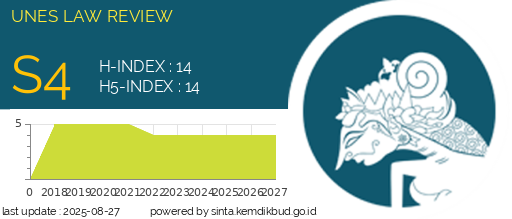Legal Analysis of Legal Protection Against Termination of Employment (PHK) by Companies Towards Breastfeeding Mothers Providing Exclusive Breastfeeding as Regulated by Presidential Regulation No. 2 Of 2022 Concerning Job Creation
DOI:
https://doi.org/10.31933/unesrev.v6i2.1286Keywords:
Legal Protection, Termination of Employment, Breastfeeding Female WorkersAbstract
This research aims to analyze the legal protection against Termination of Employment (PHK) by companies towards breastfeeding mothers providing exclusive breastfeeding, based on Presidential Regulation No. 2 of 2022 Concerning Job Creation. The research employs a normative legal research method, examining legal regulations, doctrines, and principles relevant to the legal protection of breastfeeding mothers providing exclusive breastfeeding. In order to support the implementation of Presidential Regulation No. 2 of 2022 concerning Job Creation, there is a need for collaboration and coordination among the government, businesses, cooperatives, MSMEs, and labor force. The government must ensure that this policy is implemented fairly, taking into account workers' rights and sustainable economic empowerment. Cooperation from all relevant parties is key to achieving the goals of this structural reform in the context of the complex global economic conditions. Although Presidential Regulation No. 2 of 2022 concerning Job Creation does not specifically regulate the rights of breastfeeding workers, women workers breastfeeding at the workplace are still protected by the Labor Law. This includes the right to leave, time and facilities for breastfeeding, as well as a prohibition on termination of employment on the grounds of breastfeeding. Despite the impact of this regulation on the labor sector, it is crucial to monitor and evaluate its implementation periodically to ensure that the goals of worker protection and economic empowerment are achieved as expected.
Downloads
References
Kemenkes RI. (2012). Peraturan Pemerintah Republik Indonesia No. 33 Tahun 2012 tentang Pemberian Air Susu Ibu Eksklusif.
Kemenkes RI. (2019a). Pekan Asi Sedunia (PAS). 1, 1–14.
Kemenkes RI. (2019b). Profil Kesehatan Indonesa 2019. Kementrian Kesehatan Republik Indonesia.
KSBSI. (2022). Seorang Buruh Perempuan Hamil di PHK Sepihak Oleh PT BIG Dengan Alasan Kontrak Habis. Konfederasi Serikat Buruh Sejahtera Indonesia.
Kurniawan, F., & Dewanto, W. A. (2020). Problematika pembentukan RUU cipta kerja dengan konsep omnibus law pada klaster ketenagakerjaan pasal 89 angka 45 tentang pemberian pesangon kepada pekerja yang di PHK. Jurnal Panorama Hukum, 5(1), 63–76.
Presiden RI. (2009). Undang-Undang Republik Indonesia nomor 36 tahun 2009 tentang Kesehatan.
Presiden RI. (2020). Undang-Undang Republik Indonesia Nomor 11 Tahun 2020 Tentang Cipta Kerja. In PeraturanBpkGo.id.
Ritonga, D., Fitrian, A., & Hendro, G. (2022). Execution of Decisions of the Industrial Relations Court with Permanent Legal Force (Inkracht). Policy, Law, Notary and Regulatory Issues (POLRI), 1(3), 35–44.
Sadewo, J. (2019). Ruang Laktasi yang Kerap Terabaikan. Republika Online.
Suhartini, E. (2023). Kontroversi PERPPU Nomor 2 Tahun 2022 Tentang Cipta Kerja. Djuanda University.
Ummah, F., Rosida, L., & Putri, A. K. (2023). Breastfeeding Education: A Scoping Review. Malaysian Journal of Medicine & Health Sciences, 19(2).
Zikrina, Z., Halifah, E., & Ardhia, D. (2022). Faktor-Faktor yang Mempengaruhi Dalam Pemberian ASI Eksklusif. Idea Nursing Journal, 13(3), 7–14.
Downloads
Published
How to Cite
Issue
Section
License
Hak cipta :
Penulis yang mempublikasikan manuskripnya di jurnal ini menyetujui ketentuan berikut:
- Hak cipta pada setiap artikel adalah milik penulis.
- Penulis mengakui bahwa UNES Law Review berhak menjadi yang pertama menerbitkan dengan lisensi Creative Commons Attribution 4.0 International (Attribution 4.0 International CC BY 4.0) .
- Penulis dapat mengirimkan artikel secara terpisah, mengatur distribusi non-eksklusif manuskrip yang telah diterbitkan dalam jurnal ini ke versi lain (misalnya, dikirim ke repositori institusi penulis, publikasi ke dalam buku, dll.), dengan mengakui bahwa manuskrip telah diterbitkan pertama kali di Jurnal UNES Law Review.


















